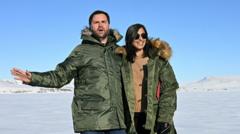An unexpected visit by Vice President JD Vance illuminates the complex relationship between Greenland and the US amid rising tensions with China.
**JD Vance's Stark Warning on Greenland's Future Amid Cultural Tensions**

**JD Vance's Stark Warning on Greenland's Future Amid Cultural Tensions**
As US Vice President JD Vance delivers a controversial message in Greenland, local sentiments about independence and foreign relations are explored.
Late Friday evening, the striking northern lights danced over Nuuk, casting an otherworldly glow that belied the tense atmosphere created by US Vice President JD Vance's recent visit to Denmark's autonomous territory of Greenland. The occasion was marked by debates over security, sovereignty, and self-determination, as Vance attempted to walk a fine line between reassurance and a foreboding sense of urgency.
During his tour of a remote military base in the Arctic, Vance painted a stark picture of the changing geopolitical landscape, stressing the necessity for Greenlanders to reconsider their long-standing ties with Denmark and to seek stronger ties with the United States. "We do not think that military force is ever going to be necessary," he stated, suggesting a more diplomatic approach. However, the overall message remained unsettling, with the Vice President stressing that Greenland must protect itself against the threats posed by an assertive China.
Vance urged, “We can’t just bury our head in the snow and pretend the Chinese are not interested in this large landmass.” He posited Greenland's strategic importance in a shifting global order that includes a contest for control over the Arctic’s resources and shipping routes among world powers like the US, China, and Russia.
Danish Prime Minister Mette Frederiksen responded brusquely to Vance's comments, marking the tension between the US narrative and Greenlandic sentiments, which appeared more focused on unity and cultural cohesion. On the same day as Vance's visit, celebrations erupted in Nuuk for the formation of a new coalition government, showcasing the strong desire among the local population for self-determination and autonomy from Danish leadership. "There are many ways to say things. I think the way Trump is saying it is not the way. It's like a threat," local artist Lisbeth Karline Poulsen remarked, reflecting a prevalent unease regarding foreign intervention.
With the public’s overwhelming longing for independence manifesting in political shifts, Greenland is cautiously navigating its path forward. The government is aware of the economic hurdles it faces if independence is pursued, but it is also wary of potential exploitation from external forces.
Vance's assertions that the US supports Greenland's quest for self-governance signals a potential partnership, yet confusion still lingers as many Greenlanders question America's true intentions. While Vance's pitch urged patience, previous aggressive rhetoric from President Trump has led local citizens to feel pressured rather than respected.
The recent cancellation of a planned cultural tour led by Vance's wife, Usha, in light of local protests highlights the discord between Greenland’s desire for respect and the US's more forceful engagement strategy. As Greenland embraces a journey towards autonomy, its leaders are hopeful for constructive dialogues yet remain vigilant against external pressures and motives that may not align with their own.




















